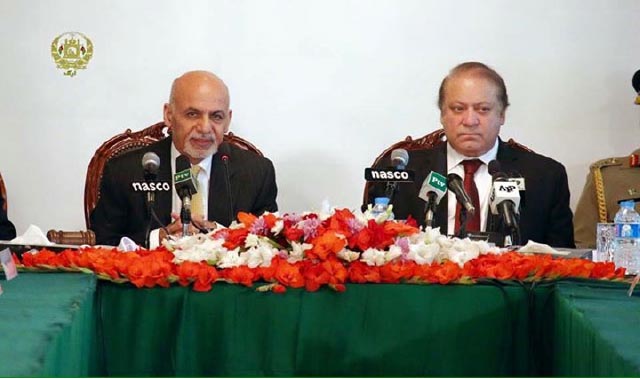“Our regional initiatives with neighbors are beginning to yield significant cooperative dividends. The exception is with Pakistan – despite clear commitments to a quadrilateral peace process; their dangerous distinction between good and bad terrorists is being maintained in practice,” these words were spoken by Afghan President Muhammad Ashraf Ghani at a NATO summit in Warsaw.
The Afghan-Pak relations have been tense for more than a decade due to differences over counterterrorism strategies and mutual distrust except for a brief period following Mr. Ghani’s administration during which efforts for a rapprochement were made by both sides. However, the brief bonhomie ended with the collapse of the reconciliation process between the Afghan government and the Taliban last year in Murree following the revelation of the Taliban’s supreme leader Mullah Omar death and the subsequent surge in terrorism in Afghanistan.
Another effort began in December last year, which resulted in forming the Quadrilateral Coordination Group (QCG), consisted of Afghanistan, Pakistan, China and the US, for bringing peace in Afghanistan, but that was also proved abortive as the Taliban refused to sit around the negotiating table with Afghan government.
Death of the Taliban’s leader Mullah Akhtar Mansour, in a US drone strike on Pakistani soil in May widened the gap between Kabul and Islamabad since Pakistani officials condemned the attack whereas Afghan politicians deemed it an appropriate and wise decision. The incident resulted in mistrust among members of the QCG and reduced their hopes for seeking talks genuinely.
With the escalating militancy and terrorist attacks in Afghanistan under the terms of “spring offensive” last year and “Omari Operation” this year, which heightened the graph of civilian and police casualties, Afghan officials believed that Pakistan does not seek a bona fide peace. Therefore, Afghan politicians, including President Ghani and Chief Executive Officer (CEO), Dr. Abdullah Abdullah, put Pakistan’s honesty under question regarding peace process. They claimed that Pakistani officials do not practice what they preach arguing that Pakistan’s soil is a safe haven for the Taliban and Haqqani network.
It is not only Afghan politicians but US officials also urge Pakistan to combat terrorism with great force. As a result, following the attack outside a building of the National Directorate for Security in Kabul that killed more then 70 people and injured around 350 others, the director of the US State Department’s Press Office, Elizabeth Trudeau, said, “We have consistently expressed our concerns at the highest level of the government of Pakistan about their continued tolerance for Afghan Taliban groups such as the Haqqani network operating from Pakistani soil.” She added that Pakistan had reiterated that it would not discriminate between terrorist groups “and we continue to call on them to live up to that commitment”.
On the other hand, however, Pakistani officials have constantly stated that they would combat terrorism genuinely and would not let their soil be used against Afghanistan. To indicate their good intention, Pakistan refers to Zarb-e-Azb operation carried out against the Taliban insurgents. In addition, Islamabad always pushes for negotiation and deems it the only viable option for peace rather than military action.
In response to Ghani’s statement in Warsaw, Pakistan’s Foreign Office said that it was “unfortunate that Afghan leaders continue to make hostile statements against Pakistan and blame Pakistan for all failures in Afghanistan”. It added that Pakistan would continue with its efforts for peace and stability in Afghanistan and asked Kabul to cooperate in its fight against terrorism.
Terrorism, this chronic problem, continues unabated despite the downfall of the Taliban’s regime when the US invaded Afghanistan as a backlash to the 9/11 episode. The warring factions, mainly the Taliban, have changed into a can of worm and challenge the security situation in spite of both soft and hard mechanisms – i.e. seeking negotiation and resorting to military action – adopted by Afghan and the US officials within the past decade and so. The Taliban’s activities inside and across the porous border has been an interminable bone of contention between Kabul and Islamabad. It is believed that Pakistan can bridge the gap through combating terrorism and rooting out the sanctuaries of the Taliban leaders and Haqqani network from its soil. It is likely that the death of the Taliban’s high-ranking officials in Pakistan’s soil will damage its reputation at international level. To show its true counter-insurgency to the world, Pakistan can target at least one or two Taliban’s leaders or simply hang some Taliban prisoners, the same as Afghanistan. To put it succinctly, Pakistan should use its “leverage” against the Taliban for two main reasons: either to come to negotiating table and hold talks or abandon its soil. Hence, the Taliban should not be able to fish in troubled water.
Home » Opinion » The Blame Game Continues
The Blame Game Continues
| Hujjatullah Zia

